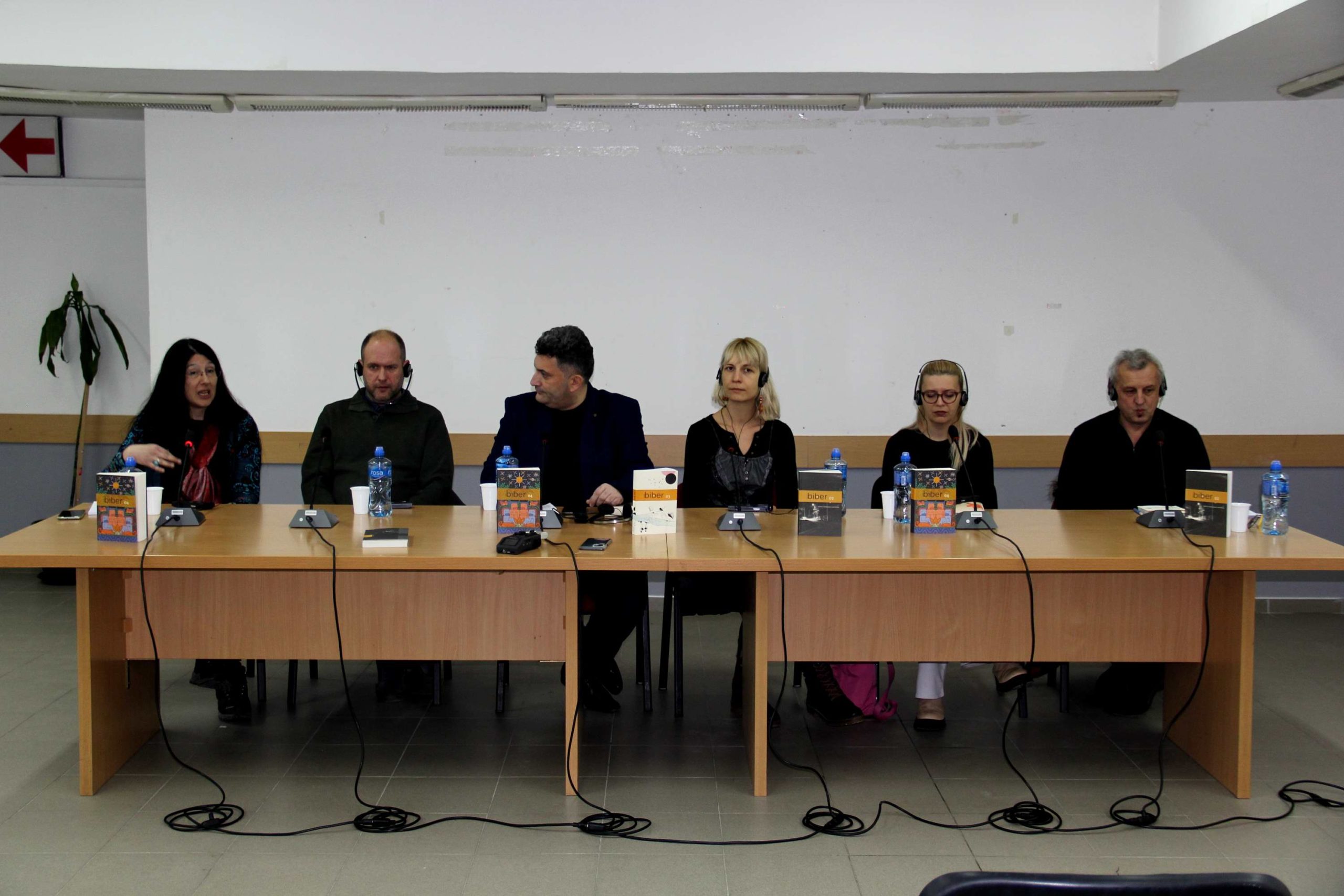The Biber Contest and the multilingual short story collections were presented today in Bujanovac, at the Vuk Karadžić Cultural Centre.
The panel discussion included authors of selected and prize-winning stories from the Biber 03 and Biber 04 contests, Marijana Čanak (Novi Žednik), Senad Jusić Čupo (Bugojno), Vesa Qena (Pristina), Ante Storić (Šibenik), and Ivana Franović (Biber Team, Centre for Nonviolent action Sarajevo-Belgrade). Jeton Ismaili was the moderator.
As the Contest and all the short story collections published so far (four in all, with the fifth round of the Contest currently underway) have been multilingual, different languages could also be heard at this promotion: Albanian, Serbian, Croatian, and Bosnian.
Ivana Franović from the Biber Team and the Centre for Nonviolent Action said:
“We are a peace organisation with a 25-year history and one of the main things we do is connecting people from across the former Yugoslavia. Through stories entered in the Biber Contest, people communicate, their fates are similar, as are their fears and their experiences. And as sad as they may be sometimes, these stories are full of love.”
The idea behind Biber is for authors writing and thinking about reconciliation in the context of the legacy left behind by the wars in the former Yugoslavia to be given a space to publish their works, to have them translated in the region and to read stories written in other languages. The Contest brings together authors, but also translators and proof-readers, as well as a large readership, because the collections are free and can be downloaded and read online.
Marijana Čanak, whose story “Razmjena” [Exchange] was published in the Biber 04 Collection talked about the importance of writing and translating into all the languages of the region:
“All the stories are available online, where they can be read. There’s always a sense of magic when you see your text in translation. The range of war trauma is such that it affects all of us. I spoke from my personal experience, I remembered people from my childhood, people who survived physically, but their souls were not left intact.”
She reflected on the Biber Contest and said she saw it as a way to build bridges between people.
“If a text is coming from a place of activism, of passion, that will be transferred onto the reader,” she concluded.
Vesa Qena, a dramatist from Pristina also spoke about her personal experience and how she incorporated it into her short story:
“My story is about a child refugee during the war who does not understand why the war is being waged and her parents not talking about it openly. The story is autobiographical, I talk about myself in it as a way to deal with what I went through, although it is easier to write about others.”
Deconstructing images of the enemy, brave stories that push boundaries, that dare to walk in the “enemy’s” shoes, these are some of the topics we welcome in the Biber Contest.
Senad Jusić whose short story is about an encounter between former enemies talked about this.
“My story is about an encounter between a victim and a torturer, which is not uncommon in Bosnia, for these people to meet in a small town. I run into my “enemy” even though we generally try not to cross paths. I am ashamed of him, he is perhaps scared of me. When we meet, I look up at the ceiling and he stares at the floor. That’s how we avoid each other, without reconciling.”
Four Biber Collections have been published so far, each with 25 short stories, and they have all been translated into Bosnian/Croatian/Serbian/Montenegrin, Albanian, and Macedonian. A collection of selected short stories from the first three contests has also been published in English translation. The fifth contest is under way and stories can be submitted until 1 June 2022. It is open to anyone who is inspired to write about these topics, be they already established and published authors or just starting out. Prizes are awarded to stories selected as the best by the jury.
Ante Storić from Šibenik, whose story “Lito” [Summer] won second prize at the 3rd Biber Contest talked about whether reconciliation and war are relevant topics also for Croatia, which is now an EU Member State:
“Becoming part of the EU does not change the fact that the war happened. Individual writers have plenty to write about. Whether their works will effect changes, that all depends on the individual. Meetings like this make sense as being beneficial to reconciliation.”
For more information about the Contest, go to biber.nenasilje.org.
Electronic editions of all Biber collections are available at https://biber.nenasilje.org/biber-price/ and are free to download.
Next week, Biber will be presented in Pristina (17 March 2022 at 7 pm in Kino Armata) and Prizren (18 March 2022 at 7 pm in Autostrada Hangar).
Link to photo gallery: https://nenasilje.org/foto-biber-promocija-u-bujanovcu-10-03-2022/
